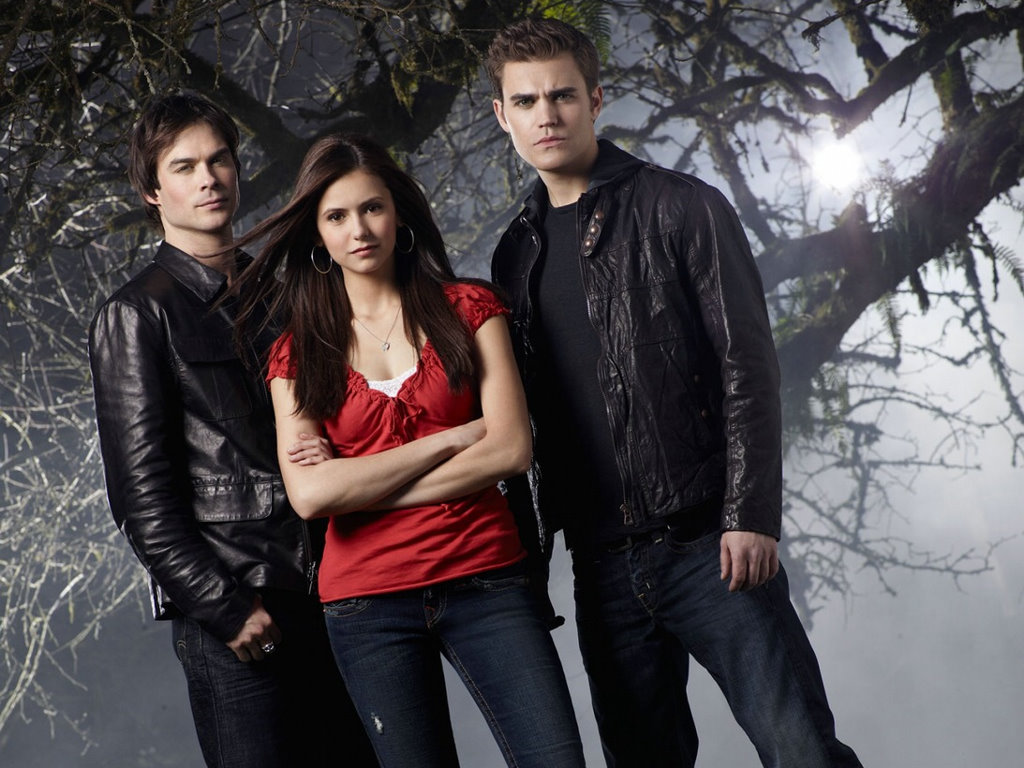small screen sirens: slayers, wolves and the supernatural
 Buffy: the Vampire Slayer was a must-watch in my house growing up. My older sister, a diehard fan at the time, would take meticulous care ensuring that the VCR was set up to record for rewatches, and then the two of us, along with my dad, mum, and newborn brother, would collapse on the couch around our tiny, thick, cube of a TV and settle in for the hour. I was seven when the series started, thirteen when it ended, and I still remember my horror at the vampires, my edge-of- the seat-enthusiasm when Buffy would unleash cans of whoop-arsery, and my empathy with the slew of supporting characters that fleshed the series out. That made the show less about attitude and kicking demon-butt and more about the created family, about love, self-sacrifice and responsibility.
Buffy: the Vampire Slayer was a must-watch in my house growing up. My older sister, a diehard fan at the time, would take meticulous care ensuring that the VCR was set up to record for rewatches, and then the two of us, along with my dad, mum, and newborn brother, would collapse on the couch around our tiny, thick, cube of a TV and settle in for the hour. I was seven when the series started, thirteen when it ended, and I still remember my horror at the vampires, my edge-of- the seat-enthusiasm when Buffy would unleash cans of whoop-arsery, and my empathy with the slew of supporting characters that fleshed the series out. That made the show less about attitude and kicking demon-butt and more about the created family, about love, self-sacrifice and responsibility.
Buffy really opened the floodgates to a dam of hyperactive, CGI-infused, supernatural series aimed at teen girls. Supernatural, Vampire Diaries, Teen Wolf, Reaper, The Secret Circle –the list goes on, only each of these represents a pointed shift in focus. Where Buffy was a series about a girl skewed at teens, regardless of gender, the genre now features male protagonists with a specific audience of teen girls.
Long-running series Supernatural is a good example of this. Two brothers, Sam and Dean Winchester, grow up fighting demons at their father’s behest following the death of their mother. Sam, the youngest, takes control of his future and heads off to law school, only to rejoin the cause when their father goes missing and his college girlfriend gets murdered by the same demon that killed their mother. The first few seasons are devoted almost exclusively to an overarching search-and-rescue narrative and a monster-of-the week episodic formula. The roles of the women are either to be dead (their mother, Sam’s girlfriend) or to be in dire need of rescue and available for the older brother, Dean, to flirt with and to reveal the all too tender heart behind his ridiculous good looks. The series is immensely popular, particularly among young women, although there’s scarce a long-standing female character at all. That’s not to say that women can only like shows with female protagonists – there are plenty of excellent shows that don’t – but Supernatural frequently casts women as plot devices, not as characters, and the show careens down the television highway like Dean’s Chevy Impala, the women firmly in the backseat, if they make it into the car at all.
Teen Wolf is different; its women certainly more prominent, but underdeveloped and reliant on masculine counterparts. The series, based on the eighties movie, is about a lacrosse-player, Scott, who gets bitten by a werewolf and spends the series trying to control his power, be a good boyfriend to his hot lady, Alison, and solving murders around town committed by a fellow werewolf. I have real mixed feelings about Teen Wolf’s ladies, who tend to swing from the convenient plot device (Scott’s mother, oh my god, don’t get me started on Scott’s mother) to the almost-awesome, daughter-of-werewolf-hunters, Alison and the whip-smart but intensely vulnerable, Lydia. Season two we get another in the form of epileptic-turned-wolf, Erica who’s around for the whole season but I couldn’t tell you anything about her except she had a Not Another Teen Movie transformation (What? She wears a top that fits her and takes out her ponytail and now she’s hot?) Teen Wolf’s ladies actually have a lot of potential, particularly Alison and Lydia, but the fact is that their development is determined by their relationship status to Scott, Stiles, Jackson or Derek, all of whom get a plot of their own, simultaneously reliant and independent of their roles with each other, something that the women do not.
The show that comes closest to the wonderfully diverse and compelling women that filled Joss Whedon’s Buffy is The Vampire Diaries. Following the death of her parents, Elena falls in love with Stefan, a vampire. Their relationship is fraught with evil vampires, Stefan’s hot brother, hunters, witchcraft and the revelation that she is in fact the doppelganger of a historical big bad. It’s not a great show, but its representation of women and women’s friendships is basically great. Elena and her two best friends, Bonnie and Caroline, are strong, smart and willing to put everything on the line for one another. Elena’s growth across the course of the four seasons currently aired, is pretty special. We watch Elena grow from damaged, grief-stricken, but horribly in-love, to damaged, but in-control, capable of transferring her weaknesses into strengths and treating self-sacrifice like a God-given talent. Elena’s no Buffy. She can’t kick butt, and to be frank, the writing can’t really hold a candle to its predecessor, but then again, it doesn’t need to. Vampire Diaries is strong on its own, and Elena is a protagonist worth watching.


Pingback: The Fifty Second Down Under Feminists Carnival | Lip Magazine
Pingback: QPF + LipMag |